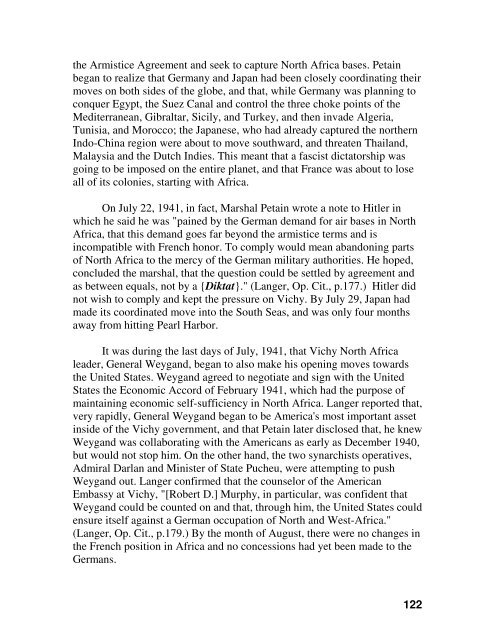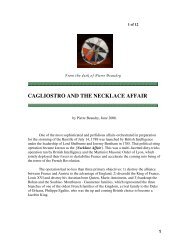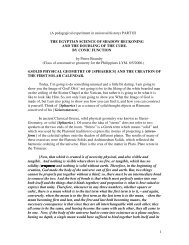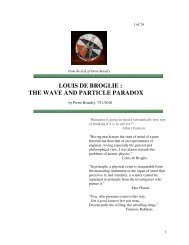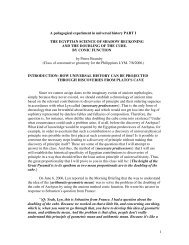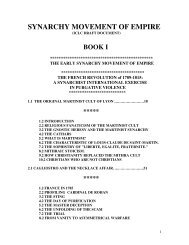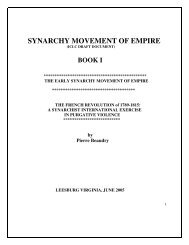synarchy movement of empire book ii - Pierre Beaudry's Galactic ...
synarchy movement of empire book ii - Pierre Beaudry's Galactic ...
synarchy movement of empire book ii - Pierre Beaudry's Galactic ...
You also want an ePaper? Increase the reach of your titles
YUMPU automatically turns print PDFs into web optimized ePapers that Google loves.
the Armistice Agreement and seek to capture North Africa bases. Petain<br />
began to realize that Germany and Japan had been closely coordinating their<br />
moves on both sides <strong>of</strong> the globe, and that, while Germany was planning to<br />
conquer Egypt, the Suez Canal and control the three choke points <strong>of</strong> the<br />
Mediterranean, Gibraltar, Sicily, and Turkey, and then invade Algeria,<br />
Tunisia, and Morocco; the Japanese, who had already captured the northern<br />
Indo-China region were about to move southward, and threaten Thailand,<br />
Malaysia and the Dutch Indies. This meant that a fascist dictatorship was<br />
going to be imposed on the entire planet, and that France was about to lose<br />
all <strong>of</strong> its colonies, starting with Africa.<br />
On July 22, 1941, in fact, Marshal Petain wrote a note to Hitler in<br />
which he said he was "pained by the German demand for air bases in North<br />
Africa, that this demand goes far beyond the armistice terms and is<br />
incompatible with French honor. To comply would mean abandoning parts<br />
<strong>of</strong> North Africa to the mercy <strong>of</strong> the German military authorities. He hoped,<br />
concluded the marshal, that the question could be settled by agreement and<br />
as between equals, not by a {Diktat}." (Langer, Op. Cit., p.177.) Hitler did<br />
not wish to comply and kept the pressure on Vichy. By July 29, Japan had<br />
made its coordinated move into the South Seas, and was only four months<br />
away from hitting Pearl Harbor.<br />
It was during the last days <strong>of</strong> July, 1941, that Vichy North Africa<br />
leader, General Weygand, began to also make his opening moves towards<br />
the United States. Weygand agreed to negotiate and sign with the United<br />
States the Economic Accord <strong>of</strong> February 1941, which had the purpose <strong>of</strong><br />
maintaining economic self-sufficiency in North Africa. Langer reported that,<br />
very rapidly, General Weygand began to be America's most important asset<br />
inside <strong>of</strong> the Vichy government, and that Petain later disclosed that, he knew<br />
Weygand was collaborating with the Americans as early as December 1940,<br />
but would not stop him. On the other hand, the two synarchists operatives,<br />
Admiral Darlan and Minister <strong>of</strong> State Pucheu, were attempting to push<br />
Weygand out. Langer confirmed that the counselor <strong>of</strong> the American<br />
Embassy at Vichy, "[Robert D.] Murphy, in particular, was confident that<br />
Weygand could be counted on and that, through him, the United States could<br />
ensure itself against a German occupation <strong>of</strong> North and West-Africa."<br />
(Langer, Op. Cit., p.179.) By the month <strong>of</strong> August, there were no changes in<br />
the French position in Africa and no concessions had yet been made to the<br />
Germans.<br />
122


